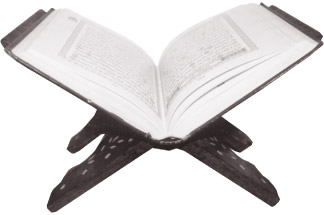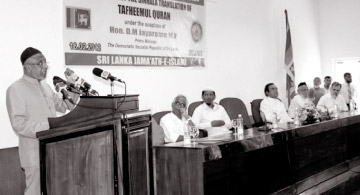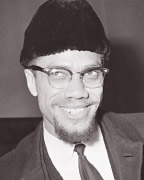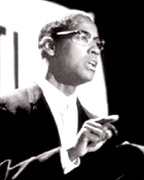|
The message of the Quran
Among the most fundamental beliefs in Islam are belief in God and
belief in prophet hood. Allah is the creator and sustainer of the
Universe and Man is his supreme creation.

God has bestowed on man many blessings in this world for the benefit
of his earthly life. But the most supreme blessing is the divine
guidance which he sent down through his prophets since the creation of
Man. This divine guidance attained its perfection and completion with
the revelation of the Quran to Prophet Muhammad who was the last
prophet.
The Quran is the divine revelation that contains Allah's message to
mankind. It is a universal message for all times and all places. The
Quran is the eternal miracle of Islam. Allah himself has undertaken the
responsibility to preserve it and true to his promise not a single word
or letter has changed since its first revelation throughout the last 14
centuries
Almighty Allah describes the Quran as guidance to mankind and its
guidance embraces and encompasses all aspects of individual and social
life, worship and devotion, human relations including marriage and
family life, social political and economic aspects and laws related to
war and peace and international relations. In this manner the Quran
provides spiritual dimension.
The most fundamental teaching of the Quran is the concept of unity or
oneness of God. From this unity of God follows logically the concept of
Unity of Mankind. ‘Mankind is a single nation’ declares the Quran. This
concept binds entire mankind into a community of international
brotherhood.
The Quran also speaks of dignity of Man and equality of Mankind. Man
is the vicegerent of God on earth - Khalifathullah. Allah has made
subservient to man to all that are in heavens and earth. Man has been
gifted with knowledge and intellect, which is the unique privilege of
man and also that distinguishes from other creations. According to the
Quran the greatest blessing, which Allah has conferred on mankind is the
divine guidance. For the conduct of his ethical and moral life, this
guidance encompasses man's total activity. According to the Quran, there
is no distinction between secular and religious aspects of Life.
According to Islam, religion or ‘Dheen’ embraces Man's entire life
activities.
The Quran speaks of diversity of nations, communities and languages.
These diversities are meant to enrich human life like flowers of
different colours and smell that adds beauty to the garden. The Quran
elucidates this concept of human brotherhood as follows.
“Oh mankind, we have created you from a single male and a female and
made you into nations and clans so you may identity one another. The
noblest among you in the sight of Allah are those who are of righteous
conduct”. This verse emphatically asserts the concept of equality of
mankind, the superiority of an individual is to be judged not by the
language, race, ethnicity or nationality. According to The Quran,
individuals and nations attain superiority by their noble conduct.
The Quran lays much emphasis on tolerance. “There is no compulsion in
religion” declares the Quran. Freedom is an important principle
repeatedly emphasized by the Quran. The Quranic message created a great
revolution in the pre-Islamic Arabian society where tribal wars,
injustice, oppression and racial pride dominated. The Quranic message
liberated that society from all forms of tyranny. On the basis of
teaching of the Quran, prophet of Islam within 23 years created a unique
social order in Medina based on brotherhood, equality, freedom and
injustice.
|

Well known Muslim scholar Dr. M A M Shukri speaking on the
teachings of the Holy Quran at a function held at the
Bandaranaike Centre for International Studies auditorium on
February 6 to release the Sinhala translation of Tafheemul Quran
by Moulana Sayyid Abdul A’la Mawdudi. Prime Minister D M
Jayaratne was the chief guest |
The Quran also stresses on social and economic justice. According to
its teaching all what Man possesses including wealth other material
possessions are a trust from God for which Man is accountable for
almighty Allah. Forbidding usury or Riba forms an integral part of
economic justice.
The Quran encourages man to use his rational faculties to understand
the wonders of Allah's creations. The very first of the Quran was ‘Iqra’
or the command to read. This was a unique call in that society that was
steeped in ignorance and superstition. The Quran repeatedly invites man
to observe the order and harmony that prevails in the universe and to
understand the majesty and supremacy of God. It invites man to apply his
reasons and reflect on God's creations.
It was this constant call of the Quran created in the minds of the
early Muslims the thirst for knowledge and also created in them the
spirit of inquiry. These teachings of the Quran ushered in a new era in
the Arabian society. Inspired by the verses of the Quran, Muslim went to
the four corners of the world in search of knowledge. They contributed
immensely for the development of all branches of science and created a
unique culture and civilization based on Quranic teachings. It was the
influence and impact of this great Islamic civilization based on Quranic
foundation that laid the foundation for renaissance in Europe and also a
scientific revolution.
Today we are living in a world, which has witnessed tremendous
progress in science and technology and man had achieved wonders in all
fields of knowledge. But it is a sad tragedy all these developments in
knowledge has not brought peace and happiness to mankind. Wars and
bloodshed, ethnic conflicts, suicide, alcoholism and immorality,
disintegration of the family, environmental crisis are contemporary
problems that have destroyed the peace and stability of the human social
order.
It is only by discovering our spiritual roots and strengthening our
moral and ethical values that we can create a peaceful world. The
message of the Quran could contribute a great deal in this global
endeavor for the creation of a peaceful social order based on equality
and justice.
American Black Muslim leader Malcolm X
Malcolm X has been described as one of the greatest and most
influential African Americans in history. He is credited with raising
the self-esteem of black Americans and reconnecting them with their
African heritage. He is largely responsible for the spread of Islam in
the black community in the United States. Many African Americans,
especially those who lived in cities in the Northern and Western United
States felt that Malcolm X articulated their complaints concerning
inequality better than the mainstream civil rights movement did.

Malcolm X |

Denzel Washington playing the role of Malcolm in the movie
Malcolm X |
Malcolm X, later called Al-Hajj Malik El-Shabazz, saw and experienced
many positive things. Generosity and open heartedness were qualities
which were impressed on him by the welcome which he received in many
places. He saw brotherhood and the brotherhood of different races and
this led him to disclaim racism and to say:
“I am not a racist... In the past I permitted myself to be used...to
make sweeping indictments of all white people, the entire white race,
and these generalizations have caused injuries to some whites who
perhaps did not deserve to be hurt. Because of the spiritual
enlightenment which I was blessed to receive as the result of my recent
pilgrimage to the Holy City of Mecca, I no longer subscribe to sweeping
indictments of any one race. I am now striving to live the life of a
true Sunni Muslim. I must repeat that I am not a racist nor do I
subscribe to the tenets of racism. I can state in all sincerity that I
wish nothing but freedom, justice and equality, life, liberty and the
pursuit of happiness for all people.”
(The preceding material was excerpted from a quote in an article
written by the Institute for Islamic Education from the Autobiography of
Malcolm X with assistance from Alex Haley, the author of Roots).
Malcolm X was born Malcolm Little on May 19, 1925 in Omaha, Nebraska.
His mother, Louis Norton Little, was a homemaker occupied with the
family's eight children. His father, Earl Little, was an outspoken
Baptist minister and avid supporter of Black Nationalist leader Marcus
Garvey. Earl's civil rights activism prompted death threats from the
white supremacist organization Black Legion, forcing the family to
relocate twice before Malcolm's fourth birthday. Regardless of the
Little's efforts to elude the Legion, in 1929 their Lansing, Michigan
home was burned to the ground, and two years later Earl's mutilated body
was found lying across the town's trolley tracks. Police ruled both
accidents, but the Little's were certain that members of the Black
Legion were responsible. Louise had an emotional breakdown several years
after the death of her husband and was committed to a mental
institution. Her children were split up amongst various foster homes and
orphanages.
Malcolm was a smart, focused student and graduated from junior high
at the top of his class. However, when a favorite teacher told Malcolm
his dream of becoming a lawyer was “no realistic goal for a nigger,”
Malcolm lost interest in school. He dropped out, spent some time in
Boston, Massachusetts working various odd jobs, and then traveled to
Harlem, New York where he committed petty crimes. By 1942 Malcolm was
coordinating various narcotics, prostitution and gambling rings.
Eventually Malcolm and his buddy, Malcolm ‘Shorty’ Jarvis, moved back
to Boston, where they were arrested and convicted on burglary charges in
1946. Malcolm placated himself by using the seven-year prison sentence
to further his education. It was during this period of
self-enlightenment that Malcolm's brother Reginald visited and discussed
his recent conversion to the Muslim religious organization the Nation of
Islam.
Intrigued, Malcolm studied the teachings of Nation of Islam leader
Elijah Muhammad. Muhammad taught that white society actively worked to
keep African-Americans from empowering themselves and achieving
political, economic and social success. Among other goals, the Nation of
Islam fought for a state of their own, separate from one inhabited by
white people. By the time he was paroled in 1952, Malcolm was a devoted
follower with the new surname ‘X’. He considered ‘Little’ a slave name
and chose the ‘X’ to signify his lost tribal name.
Intelligent and articulate, Malcolm was appointed a minister and
national spokesman for the Nation of Islam. Elijah Muhammad also charged
him with establishing new mosques in cities such as Detroit, Michigan
and Harlem, New York. Malcolm utilized newspaper columns, radio and
television to communicate the Nation of Islam's message across the
United States.
His charisma, drive and conviction attracted an astounding number of
new members. Malcolm was largely credited with increasing membership in
the Nation of Islam from 500 in 1952 to 30,000 in 1963.The crowds and
controversy surrounding Malcolm made him a media magnet. He was featured
in a week-long television special with Mike Wallace in 1959, The Hate
That Hate Produced that explored fundamentals of the Nation of Islam and
Malcolm's emergence as one of its most important leaders. After the
special, Malcolm was faced with the uncomfortable reality that his fame
had eclipsed that of his mentor Elijah Muhammad.
Racial tensions ran increasingly high during the early 1960s. In
addition to the media, Malcolm's vivid personality had captured the
government's attention. As membership in the Nation of Islam continued
to grow, FBI agents infiltrated the organization (one even acted at
Malcolm's bodyguard) and secretly placed bugs, wiretaps and cameras
surveillance equipment to monitor the group's activities.
Since his conversion Malcolm had strictly adhered to the teachings of
Islam and he married Betty Shabazz in 1958.
When Malcolm received criticism after the assassination of President
John F Kennedy for saying, “(Kennedy) never foresaw that the chickens
would come home to roost so soon,” Elija Muhammad ‘silenced’ him for 90
days. Malcolm suspected he was silenced for another reason. In March
1964 he terminated his relationship with the Nation of Islam and founded
the Muslim Mosque, Inc.
That same year, Malcolm went on a pilgrimage to Mecca, Saudi Arabia.
The trip proved life altering as Malcolm met “blonde-haired, blued-eyed
men I could call my brothers.” He returned to the United States with a
new outlook on integration. This time, instead of just preaching to
African-Americans, he had a message for all races.
Relations between Malcolm and the Nation of Islam had become volatile
after he renounced Elijah Muhammad. Informants working in the Nation of
Islam warned that Malcolm had been marked for assassination (one man had
even been ordered to help plant a bomb in his car). After repeated
attempts on his life, Malcolm rarely traveled anywhere without
bodyguards. On February 14, 1965 the home where Malcolm, Betty and their
four daughters lived in East Elmhurst, New York was firebombed (the
family escaped physical injury).
At a speaking engagement in the Manhattan's Audubon Ballroom on
February 21, 1965 three gunmen rushed Malcolm onstage and shot him 15
times at close range. The 39-year-old was pronounced dead on arrival at
New York's Columbia Presbyterian Hospital. Fifteen hundred people
attended Malcolm's funeral in Harlem on February 27, 1965. After the
ceremony, friends took the shovels from the gravediggers and buried
Malcolm themselves. Later that year, Betty gave birth to their twin
daughters.
The legacy of Malcolm X has moved through generations as the subject
of numerous documentaries, books and movies. A tremendous resurgence of
interest occurred in 1992 when director Spike Lee released the acclaimed
Malcolm X movie. The film received Oscar nominations for Best Actor (Denzel
Washington) and Best Costume Design.
‘America needs to understand Islam in the name of unity’
Malcolm X from his heart in his letter from Hajj to his people in
Harlem almost half a century ago says:
“Never have I witnessed such sincere hospitality and overwhelming
spirit of true brotherhood as is practised by people of all colurs and
races here in this ancient Holy Land, the home of Abraham, Muhammad and
all the other Prophets of the Holy Scriptures. For the past week, I have
been utterly speechless and spellbound by the graciousness I see
displayed all around me by people of all colors.
|

Malcolm X during his Hajj pilgrimage in Mecca |
“I have been blessed to visit the Holy City of Mecca, I have made my
seven circuits around the Ka'ba, led by a young Mutawaf named Muhammad.
I drank water from the well of the Zam Zam. I ran seven times back and
forth between the hills of Mt. Al-Safa and Al Marwah. I have prayed in
the ancient city of Mina, and I have prayed on Mt. Arafat.
“There were tens of thousands of pilgrims, from all over the world.
They were of all colors, from blue-eyed blondes to black-skinned
Africans. But we were all participating in the same ritual, displaying a
spirit of unity and brotherhood that my experiences in America had led
me to believe never could exist between the white and non-white.
“America needs to understand Islam, because this is the one religion
that erases from its society the race problem. Throughout my travels in
the Muslim world, I have met, talked to and even eaten with people who
in America would have been considered white - but the white attitude was
removed from their minds by the religion of Islam. I have never before
seen sincere and true brotherhood practiced by all colors together,
irrespective of their color.
“You may be shocked by these words coming from me. But on this
pilgrimage, what I have seen and experienced, has forced me to rearrange
much of my thought-patterns previously held, and to toss aside some of
my previous conclusions. This was not too difficult for me. Despite my
firm convictions, I have always been a man who tries to face facts and
to accept the reality of life as new experience and new knowledge
unfolds it. I have always kept an open mind, which is necessary to the
flexibility that must go hand in hand with every form of intelligent
search for truth.
“During the past eleven days here in the Muslim world, I have eaten
from the same plate, drunk from the same glass and slept on the same rug
- while praying to the same God - with fellow Muslims, whose eyes were
the bluest of blue, whose hair was the blondest of blond, and whose skin
was the whitest of white. And in the words and in the deeds of the white
Muslims, I felt the same sincerity that I felt among the black African
Muslims of Nigeria, Sudan and Ghana.
“We were truly all the same (brothers) - because their belief in one
God had removed the white from their minds, the white from their
behavior, and the white from their attitude.
“I could see from this, that perhaps if white Americans could accept
the Oneness of God, then perhaps, too, they could accept in reality the
Oneness of Man - and cease to measure, and hinder, and harm others in
terms of their ‘differences’ in color.
“Never have I been so highly honored. Never have I been made to feel
more humble and unworthy. Who would believe the blessings that have been
heaped upon an American Negro? A few nights ago, a man who would be
called in America a white man, a United Nations diplomat, an ambassador,
a companion of kings, gave me his hotel suite, his bed. Never would I
have even thought of dreaming that I would ever be a recipient of such
honors - honors that in America would be bestowed upon a King - not a
Negro.”
Exchange of gifts
The Prophet Muhammad (PBUH) said: “Exchange gifts with each other.
This will generate mutual feelings of love and eliminate feelings of
animosity and estrangement from your hearts.” (Mishkat) The Prophet (PBUH)
himself often used to send gifts to his illustrious companions.
The Prophet’s Companions also frequently exchanged presents and gifts
among them.
The exchange of presents augments sentiments of love and creates a
soft corner in the heart of the receiver for the donor.
In the matter of exchanging gifts always keep within your means. No
matter the status of the receiver do not think that your gift should
necessarily be a costly one. Give according to your means and whatever
is easily available.
The real worth of your gift depends on your sincerity and the nature
and depth of feelings with which you have presented the gift. It is the
feelings of sincerity, love and devotion which unite hearts. |



